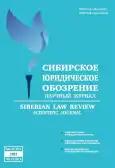Issues of Establishing the Place of Fraud Carried Out Using Information Technologies: Forensic and Criminal Procedure Aspects
- Autores: Badzgaradze G.D.1
-
Afiliações:
- St. Petersburg Law Institute (branch) of the University of prosecutor's office of the Russian Federation
- Edição: Volume 19, Nº 2 (2022)
- Páginas: 156-164
- Seção: УГОЛОВНЫЙ ПРОЦЕСС (архивный раздел)
- ##submission.datePublished##: 09.09.2022
- URL: https://bakhtiniada.ru/2658-7602/article/view/349692
- DOI: https://doi.org/10.19073/2658-7602-2022-19-2-156-164
- EDN: https://elibrary.ru/DYEXOW
- ID: 349692
Citar
Texto integral
Resumo
The Author considers some debatable issues of establishing the place of fraud committed using information technology. The result of the study is the conclusion that the current development of criminal procedure legislation does not allow to adequately resolve practical problems and conflicts, which are expressed in the failure to resolve the issues of determining the place of committing fraud, the subject of which is non-cash funds, when it was carried out through several banking and non-bank-ing transfers of non-cash funds in favor of the criminal, and proposes a solution to the problem by indi-cating in the decision of the Plenum of the Supreme Court dated November 30, 2017 No. 48 “On judicial practice in cases of fraud, misappropriation and embezzlement”, that the place of fraud, the subject of which are non-cash funds is the location (actual address) of the financial institution (branch, division, representative office of the financial institution), in which the victim had an account opened and from which the last or most transaction in the criminal interests of the subject of the crime. These changes, according to the Author, will allow solving practical problems that arise when determining the place of the preliminary investigation of fraud committed using information technology. An analysis is made of the system of places that can be considered a place of committing fraud using information technology, in a forensic sense. The Author comes to the conclusion that among such places one can single out the location of the offender, the location of the victim, as well as the location of the victim's funds, which were turned by the criminal in his favor. The result of the analysis of the problem of establishing the last place of committing fraud carried out using information technology is a statement of the absence of unequivocal answers, in connection with which the Author expresses the hope of receiving not only constructive suggestions, but also any opinions that would make it possible to get closer to its resolution.
Sobre autores
Georgiy Badzgaradze
St. Petersburg Law Institute (branch) of the University of prosecutor's office of the Russian Federation
Autor responsável pela correspondência
Email: adzgaradze98@gmail.com
ORCID ID: 0000-0001-7550-1430
Código SPIN: 5556-6375
Postgraduate Student of the Department of Criminal Procedure and Forensic Science
Rússia, 44 Liteiny pr., St. Petersburg, 191104Bibliografia
- Shuvalova M. A. Awareness of the Need to Use Innovative Technologies in Criminal Proceedings. Juridical Science: History and Modernity. 2021;1:133-139. (In Russ.).
- Zazulin A. I. Functions of Digital Information and Technologies in Criminal Proceedings. Siberian Law Review. 2020;17(1):75-82. https://doi.org/10.19073/2658-7602-2020-17-1-75-82 (In Russ.).
- Filippov A. R. The Phenomenon of Fraud in Russia of the XXI Century: Criminal-Legal, Criminological and Socio-Psychological Characteristics. Juridical Science: History and Modernity. 2021;6:134-146. (In Russ.).
- Starostenko O. A. Regularities of the Formation and Development of Cyber Fraud in Russia and Abroad. Bulletin of the Ural Law Institute of the Ministry of the of the Interior of the Russian Federation. 2021;1:138-143. (In Russ.).
- Gracheva Yu. V. Digital Technologies and Personal Security. Criminalist. 2019;1:25-29. (In Russ.).
- Barkalova E. V., Ruchkin K. V., Serova E. B. Current Issues of Criminal Prosecution for Commission of Fraud with the Use of Information and Communication Technologies. Criminalist. 2021;3:57-64. (In Russ.).
- Kostyuk M. F., Basyrova Z. R. Digital Property Crimes. Juridical Science: History and Modernity. 2021;9:154-159. (In Russ.).
- Stepanova M. A., Tsarev E. V. Problems of Determining the Place of Embezzlement of Funds Using Information and Telecommunications Technologies. Vestnik of Putilin Belgorod Law Institute of Ministry of the Interior of Russia. 2021;1:12-16. (In Russ.).
- Khaydarov A. A. Remote Fraud. Investigation and Evidence. Criminal Procedure. 2020;10:24-35. (In Russ.).
- Pavlyuchenko Yu. V. Crime Scene and Its Commission End-Time on Fraud Cases in Relation To Wire Funds Transfers. Ugolovnoe pravo. 2018;2:69-78. (In Russ.).
- Savchenko M. M. The Legal Nature of Non-Cash and Electronic Money as a Subject of Criminal Encroachments. Business. Education. Right. 2021;2:244-250. https://doi.org/10.25683/VOLBI.2021.55.235 (In Russ.).
Arquivos suplementares












